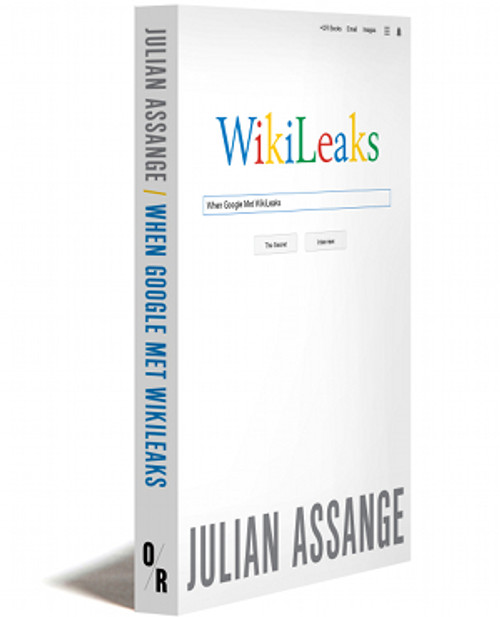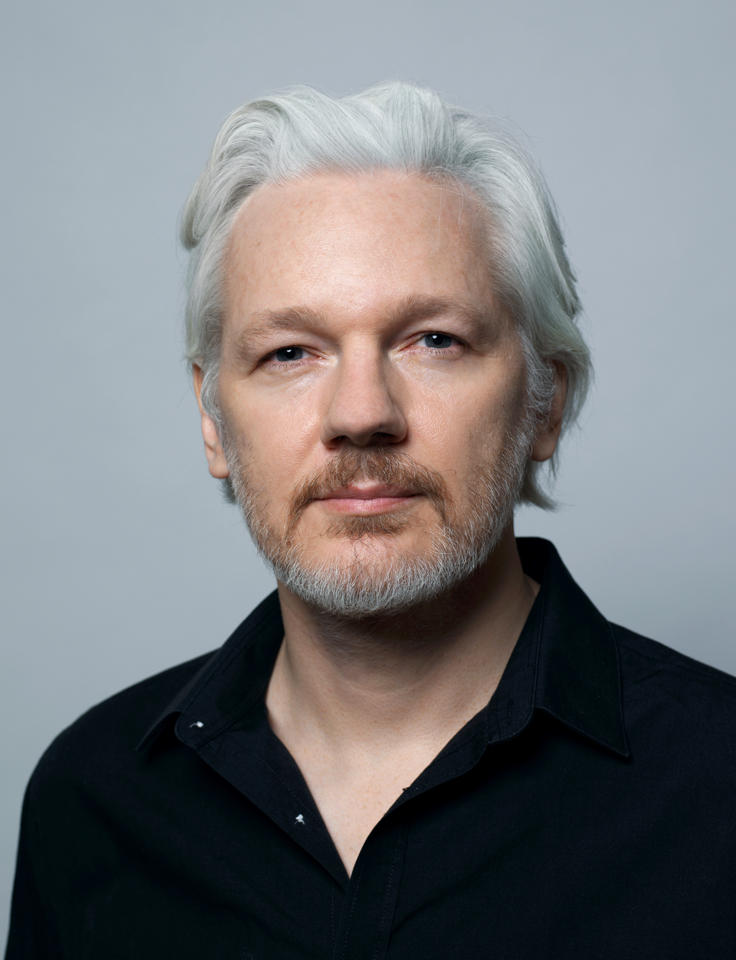Julian Assange In His Own Words
“Of all the publications about Julian Assange, this - in his own words - stands out as eloquent and powerful. It's Julian speaking.”
—John Pilgerabout the bookabout
The WikiLeaks publisher and free speech campaigner Julian Assange has, since April 2019, been remanded at a maximum security prison in London facing extradition to the United States over WikiLeaks’ groundbreaking 2010 publications. Now, in this crisp anthology, Assange’s voice emerges – erudite, analytic and prophetic.
Julian Assange In His Own Words provides a highly accessible survey of Assange’s philosophy and politics, conveying his views on how governments, corporations, intelligence agencies and the media function. As well as addressing the significance of the vast trove of leaked documents published by WikiLeaks, Assange draws on a polymathic intelligence to range freely over quantum physics, Greek mythology, macroeconomics, modern literature, and empires old and new.
Drawing on his insights as the world’s most famous free speech activist Assange invites us to ask further questions about how power operates in a world increasingly dominated by a ubiquitous internet.
Assange may be gagged, but in these pages his words run free, providing both an exhortation to fight for a better world and an inspiration when doing so.
About The Author / Editor
Julian is currently facing a 175 year sentence if extradited to the US for his work as a publisher.
Karen Sharpe lives in Paris and has worked as a teacher, journalist, writer, and editor
Preview
Activism
What to do
“People often ask, ‘What can I do?’ The answer is not so difficult. Learn how the world works. Challenge the statements and intentions of those who seek to control us behind a facade of democracy and monarchy. Unite in common purpose and common principle to design, build, document, finance and defend. Learn. Challenge. Act. Now.”
Free press activists
“We are free press activists. It’s not about saving the whales. It’s about giving people the information they need to support whaling or not support whaling. Why? That is the raw ingredients necessary to make adjustments to society and without that we’re just sailing in the dark.”
Courage is contagious
“This is why Tiananmen Square is so heavily policed in China, because it’s a congregation point where courage can spread like a contagion.”
Censorship
An opportunity
“[Censorship] is always an opportunity, because it reveals a fear of reform. And if an organization is expressing a fear of reform, it is also expressing the fact that it can be reformed.”
Who controls the present controls the past
“Important bits of recent history that were relevant to an ongoing presidential campaign in the United States were pulled out of the intellectual record. … Not only have they ceased to exist, they have ceased to have ever existed. It is the modern implementation of [George] Orwell’s dictum: ‘Who controls the past controls the future; who controls the present controls the past’—because all records of the past are stored physically in the present.”
Empire
True human cost of empire
“Only by approaching this corpus [the State Department cables], holistically—over and above the documentation of each individual abuse, each localized atrocity—does the true human cost of empire heave into view.”
Communications medium is the empire
“The study of empires has long been the study of their communications. Carved into stone or inked into parchment, empires from Babylon to the Ming Dynasty left records of the organizational center communicating with its peripheries. However, by the 1950s students of historical empires realized that somehow the communications medium was the empire. Its methods for organizing the inscription, transportation, indexing and storage of its communications, and for designating who was authorized to read and write them, in a real sense constituted the empire. When the methods an empire used to communicate changed, the empire also changed.”
Threatened by a wild colonial boy
“How could this very establishment in the United Kingdom, which has been in power for hundreds of years, feel threatened? … It has many components: the intelligence services, the banks, the landed gentry… the commercial media. It has the BBC, which is the big propaganda organism that helps keep the country cohesive. It is quite a sophisticated power structure with these interplaying parts. How could they feel threatened by a wild colonial boy from Australia…?”
in the media
Julian Assange In His Own Words
“Of all the publications about Julian Assange, this - in his own words - stands out as eloquent and powerful. It's Julian speaking.”
—John Pilgerabout the bookabout
The WikiLeaks publisher and free speech campaigner Julian Assange has, since April 2019, been remanded at a maximum security prison in London facing extradition to the United States over WikiLeaks’ groundbreaking 2010 publications. Now, in this crisp anthology, Assange’s voice emerges – erudite, analytic and prophetic.
Julian Assange In His Own Words provides a highly accessible survey of Assange’s philosophy and politics, conveying his views on how governments, corporations, intelligence agencies and the media function. As well as addressing the significance of the vast trove of leaked documents published by WikiLeaks, Assange draws on a polymathic intelligence to range freely over quantum physics, Greek mythology, macroeconomics, modern literature, and empires old and new.
Drawing on his insights as the world’s most famous free speech activist Assange invites us to ask further questions about how power operates in a world increasingly dominated by a ubiquitous internet.
Assange may be gagged, but in these pages his words run free, providing both an exhortation to fight for a better world and an inspiration when doing so.
About The Author / Editor
Julian is currently facing a 175 year sentence if extradited to the US for his work as a publisher.
Karen Sharpe lives in Paris and has worked as a teacher, journalist, writer, and editor
Preview
Activism
What to do
“People often ask, ‘What can I do?’ The answer is not so difficult. Learn how the world works. Challenge the statements and intentions of those who seek to control us behind a facade of democracy and monarchy. Unite in common purpose and common principle to design, build, document, finance and defend. Learn. Challenge. Act. Now.”
Free press activists
“We are free press activists. It’s not about saving the whales. It’s about giving people the information they need to support whaling or not support whaling. Why? That is the raw ingredients necessary to make adjustments to society and without that we’re just sailing in the dark.”
Courage is contagious
“This is why Tiananmen Square is so heavily policed in China, because it’s a congregation point where courage can spread like a contagion.”
Censorship
An opportunity
“[Censorship] is always an opportunity, because it reveals a fear of reform. And if an organization is expressing a fear of reform, it is also expressing the fact that it can be reformed.”
Who controls the present controls the past
“Important bits of recent history that were relevant to an ongoing presidential campaign in the United States were pulled out of the intellectual record. … Not only have they ceased to exist, they have ceased to have ever existed. It is the modern implementation of [George] Orwell’s dictum: ‘Who controls the past controls the future; who controls the present controls the past’—because all records of the past are stored physically in the present.”
Empire
True human cost of empire
“Only by approaching this corpus [the State Department cables], holistically—over and above the documentation of each individual abuse, each localized atrocity—does the true human cost of empire heave into view.”
Communications medium is the empire
“The study of empires has long been the study of their communications. Carved into stone or inked into parchment, empires from Babylon to the Ming Dynasty left records of the organizational center communicating with its peripheries. However, by the 1950s students of historical empires realized that somehow the communications medium was the empire. Its methods for organizing the inscription, transportation, indexing and storage of its communications, and for designating who was authorized to read and write them, in a real sense constituted the empire. When the methods an empire used to communicate changed, the empire also changed.”
Threatened by a wild colonial boy
“How could this very establishment in the United Kingdom, which has been in power for hundreds of years, feel threatened? … It has many components: the intelligence services, the banks, the landed gentry… the commercial media. It has the BBC, which is the big propaganda organism that helps keep the country cohesive. It is quite a sophisticated power structure with these interplaying parts. How could they feel threatened by a wild colonial boy from Australia…?”









